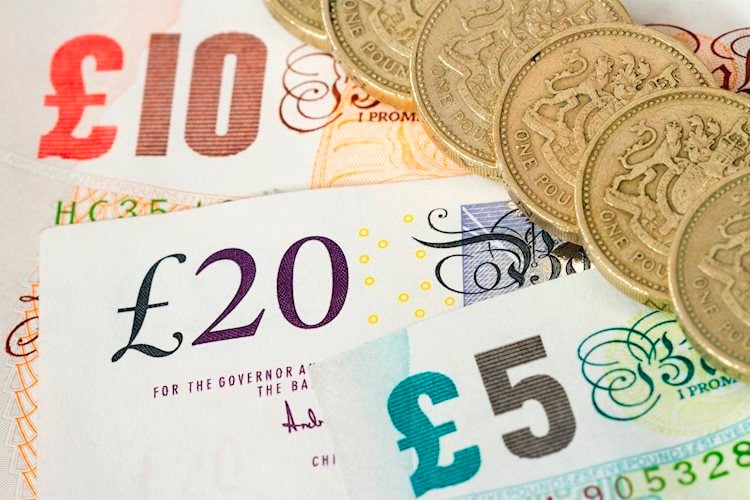- Pound Sterling rebounds as market mood improves on soft US core PCE price index data.
- High UK inflation would allow BoE policymakers to maintain a hawkish tone on interest rates.
- The US Dollar falls sharpy on softer inflation outlook.
The Pound Sterling (GBP) bounces back strongly as the US Core Personal Consumption Expenditure (PCE) Price Index data softened in December. Monthly core PCE grew by 0.2%, which was in-line with estimates. The annual core PCE data decelerated to 2.9% against expectations of 3% and the former reading of 3.2%.
Going forward, investors will focus on the interest rate decisions by the Bank of England (BoE) and the Federal Reserve (Fed) next week. Both central banks are widely anticipated to keep the monetary policy unchanged for the fourth straight time but guidance on interest rates for the entirety of 2024 will be keenly watched.
BoE policymakers are expected to refrain from rate-cut discussions as the United Kingdom economy is still experiencing significantly higher inflationary pressures than the US. There, however, policymakers could provide some cues about future interest rate-cuts. The Summary of Economic Projections (SEP) published after the last Fed meeting showed members on average predicting three rate cuts in 2024. Before the Fed’s interest rate decision, softer core PCE data is expected to elevate the odds favoring a rate-cut in March.
Daily Digest Market Movers: Pound Sterling recovery further while US Dollar cracks
- Pound Sterling finds significant bids as investors shift focus towards the interest rate decision by the Bank of England, which will be announced next week.
- The BoE is widely anticipated to maintain interest rates steady at 5.25% for the fourth time in a row.
- Investors will keenly watch whether BoE policymakers will follow the Fed or the European Central Bank (ECB) and start discussing making costs to interest rates.
- Unlike the ECB and the Fed, BoE policymakers have not offered any timeframe or projections for rate cuts amid high inflationary pressures.
- The core inflation in the United Kingdom economy is at 5.1%, significantly far from the desired rate of 2%, and higher than the US and Eurozone (3.9% and 3.4% respectively).
- This could mean the BoE to be the laggard among Group of Seven central banks in commencing a “rate-cut campaign”.
- Meanwhile, improving business confidence in the economic outlook amid hopes of rate cuts could make price pressures more persistent.
- PMI numbers, reported by the S&P Global for January, were significantly up and marked a promising start for 2024. Also, Oil supply disruptions in the Red Sea could escalate inflationary pressures in the manufacturing sector.
- This could allow BoE policymakers to stretch the restrictive interest rate stance.
- The United States Q4 Gross Domestic Product (GDP) data, released on Thursday, indicated that the economy is growing at a robust pace, allowing Federal Reserve (Fed) policymakers to hold back interest rate-cuts in the first-half of 2024.
- The US Dollar Index (DXY) falls sharply to near 103.23 as soft US core PCE report has indicated a subsiding outlook on inflation.
Technical Analysis: Pound Sterling climbs to near 1.2750
Pound Sterling jumps to near 1.2750 against the US Dollar after soft US core PCE data . The broader price action in the GBP/USD pair demonstrates a steep contraction in volatility. The near-term demand for the Cable is stable as it is aiming to sustain above the 20-period Exponential Moving Average (EMA), which trades around 1.2700. An inventory adjustment auction after a sharp rally is visible on the daily timeframe, which signifies an absence of a potential economic trigger for fresh guidance.
The 14-period Relative Strength Index (RSI) oscillates in the 40.00-60.00, indicating absence of fresh impetus.
Inflation FAQs
Inflation measures the rise in the price of a representative basket of goods and services. Headline inflation is usually expressed as a percentage change on a month-on-month (MoM) and year-on-year (YoY) basis. Core inflation excludes more volatile elements such as food and fuel which can fluctuate because of geopolitical and seasonal factors. Core inflation is the figure economists focus on and is the level targeted by central banks, which are mandated to keep inflation at a manageable level, usually around 2%.
The Consumer Price Index (CPI) measures the change in prices of a basket of goods and services over a period of time. It is usually expressed as a percentage change on a month-on-month (MoM) and year-on-year (YoY) basis. Core CPI is the figure targeted by central banks as it excludes volatile food and fuel inputs. When Core CPI rises above 2% it usually results in higher interest rates and vice versa when it falls below 2%. Since higher interest rates are positive for a currency, higher inflation usually results in a stronger currency. The opposite is true when inflation falls.
Although it may seem counter-intuitive, high inflation in a country pushes up the value of its currency and vice versa for lower inflation. This is because the central bank will normally raise interest rates to combat the higher inflation, which attract more global capital inflows from investors looking for a lucrative place to park their money.
Formerly, Gold was the asset investors turned to in times of high inflation because it preserved its value, and whilst investors will often still buy Gold for its safe-haven properties in times of extreme market turmoil, this is not the case most of the time. This is because when inflation is high, central banks will put up interest rates to combat it.
Higher interest rates are negative for Gold because they increase the opportunity-cost of holding Gold vis-a-vis an interest-bearing asset or placing the money in a cash deposit account. On the flipside, lower inflation tends to be positive for Gold as it brings interest rates down, making the bright metal a more viable investment alternative.

-638418523529094294.png)